Institutional Context
Summary
The University of Wolverhampton is an anchor institution and civic partner whose priorities are dictated by its place and communities and delivered through purposeful collaborative engagement.
We work in partnership at all levels; a collaborative ethos and approach that enables us to make the most meaningful and significant contribution in supporting our students and communities.
Our investment in advanced facilities, applied research profile, and strong business engagement ethic are all contributing factors to our position as a significant strategic force in the educational, cultural, and economic development across the Black Country and wider West Midlands.
Creating and delivering life transforming opportunities in partnership with, and for, our students and our communities remains our core mission and institutional priority.
Institutional context
With roots back to our inception as a Mechanics Institute in 1827, the University of Wolverhampton places a primacy on putting its students first and being a key partner in helping address the many complex challenges and opportunities faced by its place. We achieve this operating from three main campuses in Wolverhampton, Walsall and Telford, plus the specialist Springfield Campus.
Our vision and mission are delivered through partnership working and shaped by our location and communities. As an anchor institution in our place, we address societal issues and challenges through purposeful engagement and the co-creation of knowledge and its dissemination.
Place, partnership, and people really matter to the university, and this was exemplified during the Covid-19 pandemic. The negative effect of Covid-19 was ubiquitous, but it also served as a catalyst for innovation, with the university at the forefront, working as a true community partner, sharing, and exchanging core parts of its business for the collective good. One of many examples of this include the leading role the University of Wolverhampton undertook in working alongside a range of civic partners to set up a dedicated community interest company to produce PPE at scale. With university-led fundraising, volunteering support and academic expertise and leadership, PPE Hwb Wrecsam distributed thousands of life-saving units to a range of key sectors, directly helping the vulnerable in prisons, care homes, community, and faith centres amongst many others.
We understand our place and develop sustainable plans and solutions in response. Our agile structures and flexible approach are key ingredients in a sub-region where the SME base is predominantly small and micro.
We work with intent and match this with investment. Our £120m Springfield Campus is an example, one that involved the creation of a national centre of excellence which is industry shaped and informed and that prioritises knowledge transfer and knowledge exchange principles and practices. Also, the university worked closely with partners to host and deliver the very successful British Art Show 9, a highly prestigious national level public engagement event.
Importantly, we are an influential partner in the wider city-region, aligning our offer to the region’s Plan for Growth and working with our partners to ensure that the sub-region has a representative voice. A voice that advocates for our left-behind communities to achieve fairness, create opportunities, and deliver real and inclusive growth.
In its totality our submission demonstrates that we are making a real difference to our business base, our people, and our place through the delivery of impactful community and public engagement activity as well as contributing fully to achieving local growth and regeneration objectives. Our achievements have been built through partnership working, trust-based collaboration, and an engagement and commitment to the wellbeing and success of our place. We will continue with this way of working because it is making a difference and validates the University of Wolverhampton’s role, value, and importance within and for its communities.
For further information, please send queries to engage@wlv.ac.uk
Local Growth and Regeneration
Summary of approach
University of Wolverhampton (UoW) is committed to its civic role and duty. As an anchor institution operating across the West Midlands, transforming its society by ensuring the needs of place and people are at the heart of everything. Place informs the courses taught, research delivered, skills it equips people with and regeneration projects invested in. Our approach to local growth and regeneration focuses on skills, improvements to physical place and economic development.
UoW leads on several ambitious local growth and physical regeneration projects to drive economic growth through delivery of skills and knowledge exchange programmes within a clearly defined geography. With Inclusive Student Success and Place at its core, our 2030 strategy cements our position as the University of Opportunity.
Aspect 1: Strategy
UoW’s expansive footprint presents major opportunity to define and shape the skills, economy and physical place in the areas we operate.
The map below illustrates our physical footprint which we consider to be our local area.
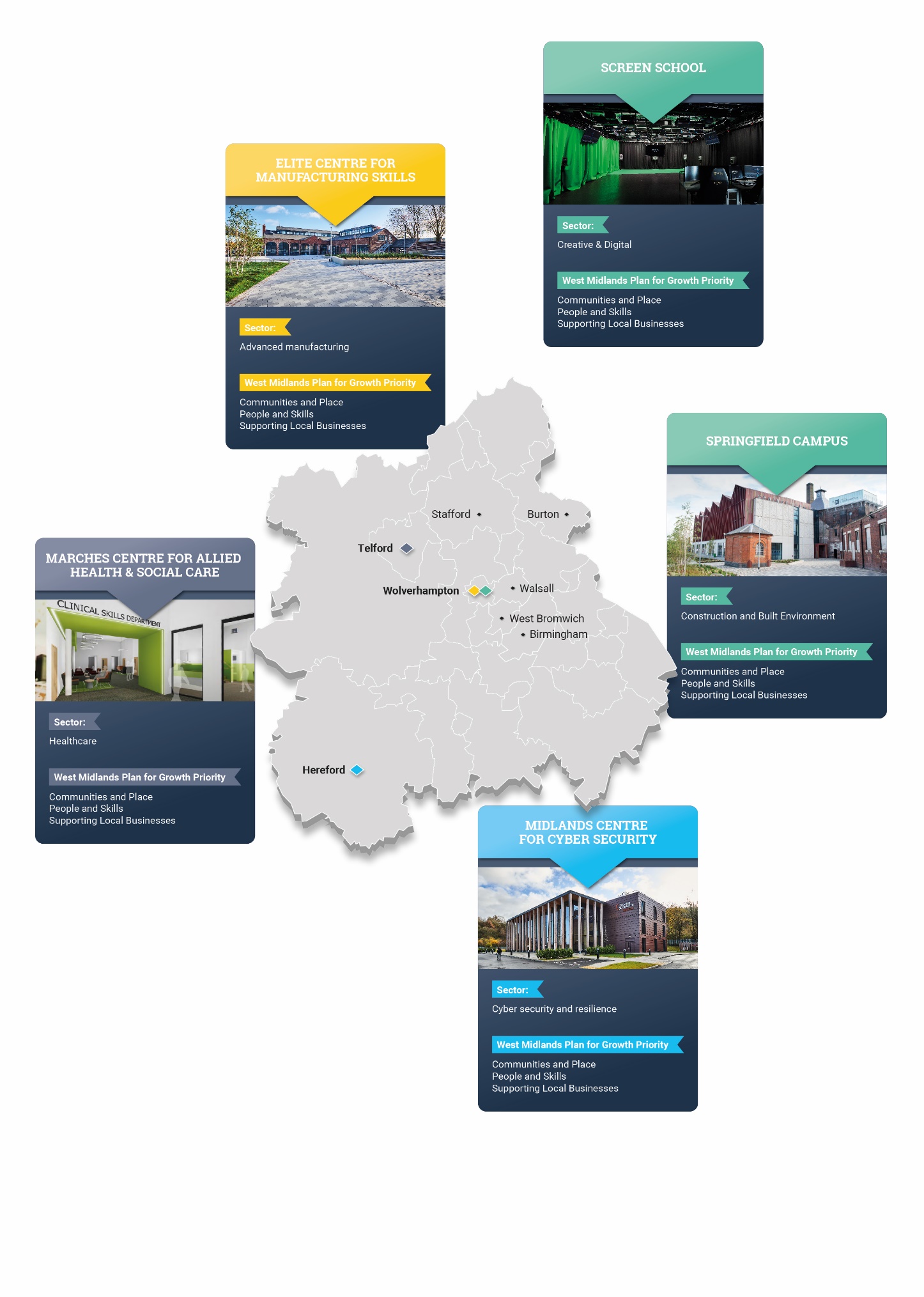
Figure 1 - University of Wolverhampton Local Area
UoW resides within West Midlands Combined Authority (WMCA) which includes 18 local authorities and three local enterprise partnerships (LEPs). We are proud of our regional footprint and our work is shaped and informed by our external stakeholders and partners from across the communities within which we operate.
Until March 2020, UoW was a lead deliverer of the ‘people, skills and employment’ strand of the West Midlands Local Industrial Strategy (WMLIS) and the regional skills plan within it. The strategy built on the strengths of the automotive, life sciences, creative and business services sectors with digital and construction at the heart of the regional economy to deliver inclusive growth and high-skilled jobs. However, in March 2020 Covid-19 destroyed global, national, regional, and local economies requiring completely refreshed approaches to national, regional, and local economic development and regeneration policies ensuring the UK was able to build back better and recover from the pandemic.
In December 2022, directly linked to UK Governments ‘build back better: our plan for growth’ strategy, WMCA launched its ‘West Midlands – Plan for Growth’ outlining the regional path to recovery ensuring the West Midlands returns as the fastest growing region outside of London. As a result, UoW is re-aligning its strategic approaches to local growth and regeneration to relevant strategies and future activities, projects, and programmes of work to the key themes and priorities set out in the plan. UoW is working with WMCA and local authority partners on applications to UK Shared Prosperity and Levelling Up funding to support local and regional economic growth plans.
UoW operates on an evidence-based approach to address the skills, social, economic, and cultural needs of the places we serve and to achieve our local growth and regeneration outputs within our defined geography. Our Strategic Plan 2016-2021, Vision 2030, Research, Regional and Business Engagement sub-strategies explicitly list and deliberately align with thematic priorities and key employment sectors set out in the ‘West Midlands – Plan for Growth’ (Figure 2) and complement the strategic economic plans of the three LEP areas within which we operate Black Country LEP, Marches LEP, Stoke and Staffordshire LEP.
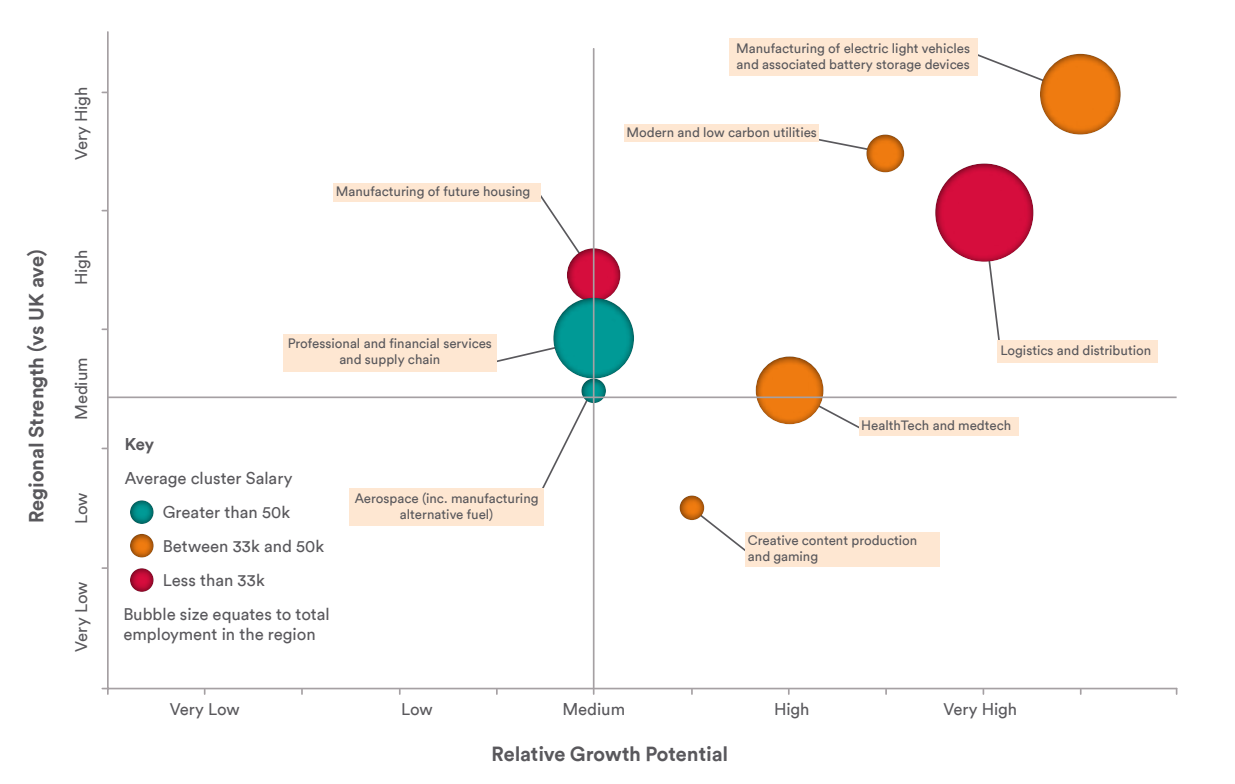
Figure 2 - West Midlands Plan for Growth - Key Employment Sectors
To understand regional strategic priorities, evidence need and ensure that our skills, place improvements and economic development activities are aligned to the skills and economic priorities of each LEP area, we have developed exceptional working relationships with the three LEPs (board and steering group members of two); civic and business support organisations, including City of Wolverhampton (CWC), Walsall, Telford & Wrekin (T&WC), Hereford & Worcester (H&WC), Staffordshire County (SCC) and Shropshire councils; chambers of commerce, growth hubs and public and private sector organisations. Undertaking formal consultation with our delivery partners ensures we continually deliver against the regional priorities (Figure 1) to improve place and the regional economy.
Several of our successful local growth and regeneration programmes rely on external funding mechanisms administered through LEPs such as European Regional Development Fund ERDF), Growth Deal, Land and Property Investment Fund. and since autumn 2022 we have begun exploring UK Shared Prosperity and Levelling Up Funding. Funds are awarded based on the ability to evidence ‘need’ against the strategic priorities of each LEP via a full business case and application. The University manages 22 public funded projects with a total project value of almost £125m and a total grant value of £56m delivering across five LEP areas.
Aspect 2: Activity
The following activities are key outputs of our Strategic Plan 2016-2021 and 2030 Vision strategy. Each project contributes to the ‘people, skills and employment,’ ‘place,’ and ‘business environment’ and ‘supporting local business’, ‘communities and place’, and ‘people and skills’ thematic priorities of the WMLIS and West Midlands Plan for Growth outlined in the strategy section.
Springfield Campus
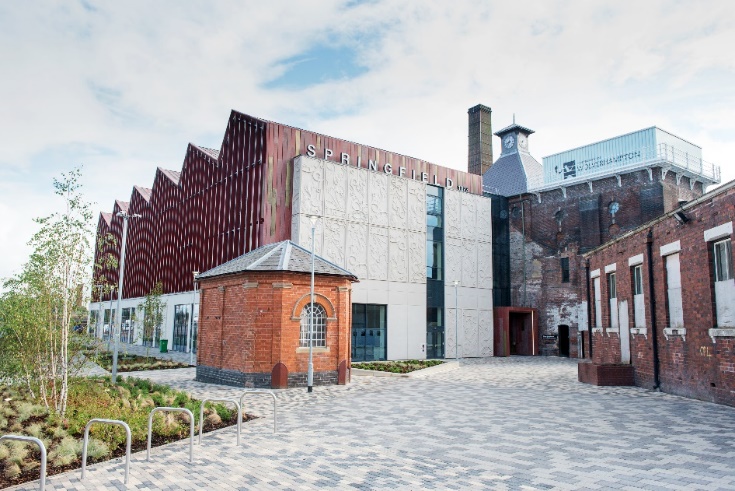
Figure - Springfield Campus
The £120m Springfield Campus seeks to stimulate economic regeneration in Wolverhampton and the Black Country by creating a national centre for sustainable construction and circular economy. The 12 acre site, brings together school-level education, employer training provision and higher education on one site.
The campus is a significant regeneration project for the West Midlands and the world’s largest construction education campus, developing the skills and knowledge base for the future of construction.
In August 2020, UoW’s School of Architecture and Built Environment (SOABE) re-located to a purpose-built £45m building on the campus, delivering the glue which will hold the public sector offer together, unlocking private sector industry partners, professional bodies, and supply chain members to ‘buy in’ to the vision for the campus and commit to co-location and/or co-delivery of education, research and innovation.
The vision responds to three of the BCLEP’s five transformational growth sectors – advanced manufacturing, building technologies, and environmental technologies.
UoW worked closely with the WMCA, BCLEP, CWC to understand their strategic growth objectives outlined in BCLEP strategic economic plan. Our application to growth deal funding evidenced how SOABE will unlock these objectives by:
raising employability, education and skills
improving Black Country (BC) business competitiveness
Brownfield Research and Innovation Centre (BRIC)
BRIC highlighted urgent need for high quality brownfield research and innovation across the WM and provided the catalyst for the establishment of a National Brownfield Institute (NBI), led by UoW, in partnership and supported by key stakeholders, including CWC, BCLEP and WMCA, to create a world-class industry cluster focusing on brownfield regeneration at Springfield Campus. The NBI officially opened in September 2022 and is ideally placed to identify and address gaps in current provision, with a particular focus on the digital skills needed to transform the industry, bringing together expertise from across the region and further afield with greater focus on construction design, building information modelling (BIM), off-site, modular construction, and lean construction methodologies.
The institute features state-of-the-art robotic technology including “Spot”, an agile, mobile robot dog, designed by Boston Dynamics; the latest wearable and hand-held laser scanning devices used for high-quality reality capture of buildings and sites; and an immersive visualisation suite, Igloo Vision, providing businesses with access to equipment which stimulates collaboration, simulation and visualisation.
The NBI is securing the City of Wolverhampton's position as a leader internationally in sustainable construction, circular economy and brownfield development, and will deliver new skills, jobs and opportunities for local people.
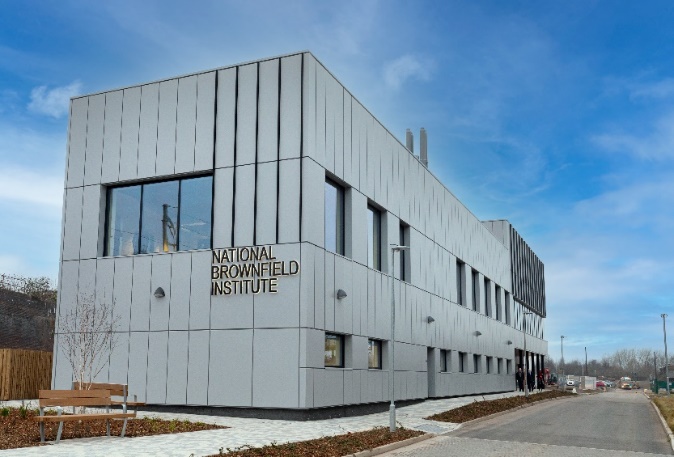
Figure 4 - National Brownfield Institute
Elite Centre for Manufacturing Skills
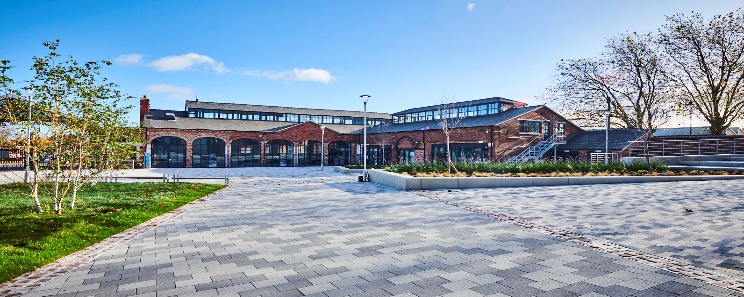
Figure 5 - ECMS Springfield Campus
The £12.5m Elite Centre for Manufacturing Skills (ECMS) based at Springfield Campus opened in October 2018, and is a flagship project in the Black Country LEP/Midlands Engine’s 2014 SEP, which committed £7.2m Growth Deal funding. ECMS works in collaboration with several key stakeholders in the BC region including the Cast Metals Federation and Dudley College.
The ECMS is an employer-led training facility designed to improve productivity and growth in the high value manufacturing sector, with particular emphasis on the engineering and motor vehicle sectors, helping to support the development of productivity and growth in SMEs.
The ECMS operates from two purpose-built centres; one at Springfield Campus in Wolverhampton and a second in Tipton, which is home to the National Foundry Training Centre (NFTC),
Between 2019-2022, several business events have taken place at the ECMS, including a training associates conference, equipment demonstrations and business workshops.
The NFTC has also delivered equipment demonstrations and foundry awareness sessions to employed and unemployed individuals interested in the casting and metals industry. The level 3 apprenticeship foundry technician course entered its cohort 5 delivery.
Midlands Centre for Cyber Security (MCCS)
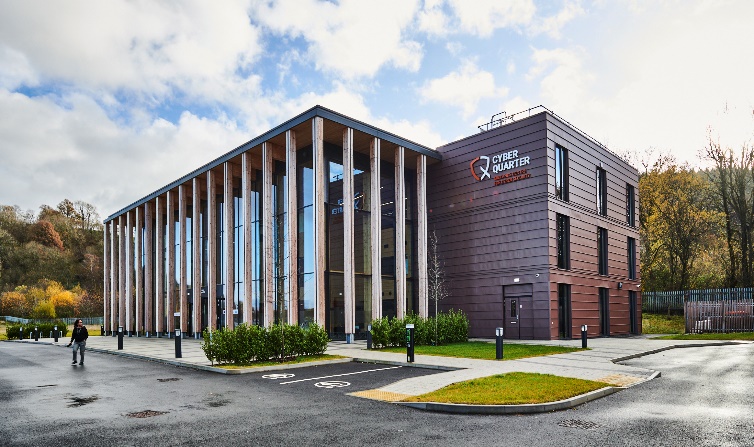
Figure 6 - Midlands Centre for Cyber Security
The Marches SEP identified a lack of critical mass of business activity, a limited university offer, low levels of R&D and commercialisation and poor virtual connectivity. In response, UoW invested £500,000 through its Research Investment Fund to set up Wolverhampton Cyber Research Institute (WCRI). Its focus is to enhance cybersecurity research and knowledge exchange; and to develop and sustain a leading, world class, multi-disciplinary cyber research centre to influence cyber policy and decision-making, ensuring protection of businesses and individuals in cyberspace.
WCRI plays a leading role in the Cyber Quarter - Midlands Centre for Cyber Security at Hereford and December 2021 saw the official opening of the MCSS based at Skylon Park on the Herefordshire Enterprise Zone. It is a joint venture between the UoW and Herefordshire Council, part-funded by the Government’s Local Growth Fund, via the Marches LEP and ERDF.
The £9m state-of-the-art hub supports innovation and industry in the sector, offering a package of tailored security testing, training, R&D and sector expertise to businesses and investors.
Supported by the University’s WCRI, the centre offers space for up to 16 cyber SMEs as well as offering product testing and certification, CPD and short courses and cyber conferences attracting experts from across the globe.
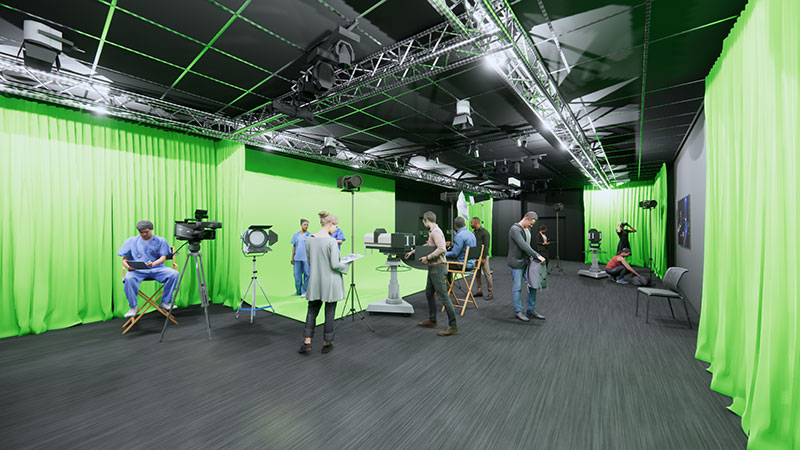
Figure 7 - University of Wolverhampton Screen School
The WMLIS highlights creative content as a major growth market for the region and shows there is a latent demand within the business base across the BC. An employer survey suggested that nationally one third of employers in the screen industries experienced recruitment difficulties and skill gaps in the year prior to the survey, particularly in areas such as visual effects, games and animation.
To directly address these needs, March 2022 saw the official opening of UoW’s state-of-the-art £5m Screen School. The school is the ambitious epicentre for stimulating screen-based culture, education, research and industrial development within the region and beyond.
Working with external stakeholders, it provides a diverse student talent pipeline to address the known and anticipated skills gaps. It will be the ‘face’ of a new regional technological frontier as well as the impetus for local regeneration, partly by offering our facilities to the creative industries for usage and growth. It will promote start-up activity and encourage business engagement in an accessible region that remains opportune for development.https://esports-news.co.uk/2022/06/08/wolves-esports-university-rocket-league-bootcamp-new-partner/
Marches Centre for Excellence for Health and Social Care
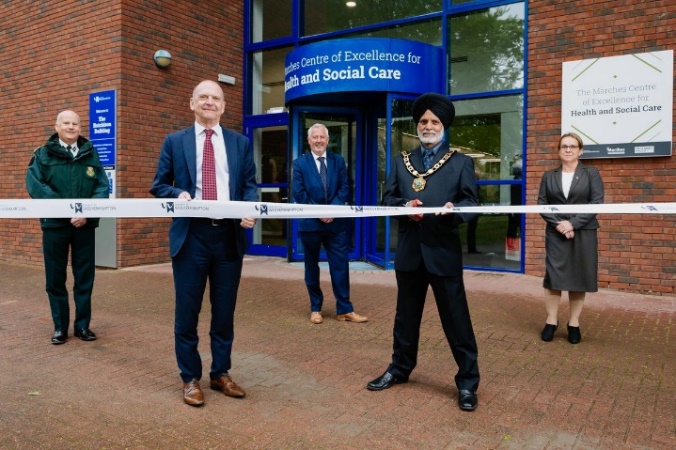
Figure 8 - Official Opening of Marches Centre of Excellence for Health and Social Care
In May 2021, UoW and partners officially opened the Marches Centre for Excellence for Health and Social Care to proactively address shortfalls in health professionals across the Marches area with an emphasis on local people and students who will be become regional key workers.
The £5million health and social care centre received £3.5m Growth Deal funding from the Marches LEP. It provides hands-on experience and training to the next generation of key workers and features state-of-the-art training facilities including simulation facilities, Anatomage ‘virtual dissection’ tables, a dedicated room for paramedic science, a mock house and various teaching spaces for courses including nursing, paramedic science and social care.
The centre opened during the pandemic and saw a number of students complete their studies and enter into employment with the NHS, Ambulance Service and health and social care providers, actively contributing to the frontline response.
British Art Show 9
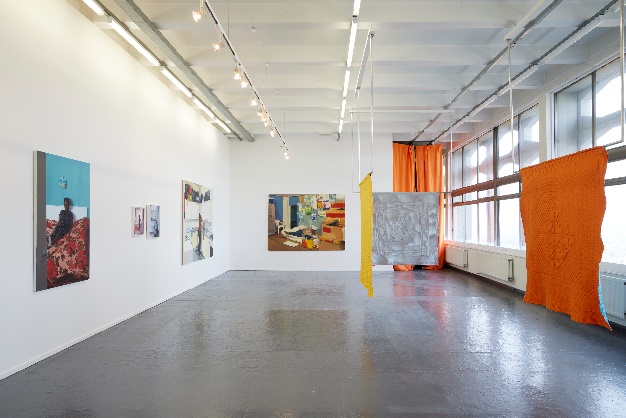
Figure 9 - Exhibition at British Art Show 9 (Credit Stuart Whipps)
In February 2021 UoW, in partnership with CWC and Hayward Gallery Touring committed to collaboratively host the British Art Show (BAS9) in the city. BAS9 supported the development of Wolverhampton’s cultural strategy at a pivotal moment for the city as it launched a new Arts Council England Cultural Compact.
This collaborative approach demonstrated the commitment from both organisations to city-wide cultural investment and an extension to the cultural offer for the city. This partnership provided a huge opportunity to put Wolverhampton on the map and create a sustainable legacy for the city.
BAS9 has laid the foundations for further collaborations between the city council and the University in developing an arts and culture scene that will support recruitment and engagement of students and prospective staff looking to live and work in the city.
UoW also maximised stakeholder relationships by securing a significant in-kind contribution from our strategic partner, Willmott Dixon Interiors, used to completely refurbish the 7th floor of the art school building.
ERDF Business Growth Projects
Between 2019-2022, UoW administered several ERDF business growth programmes focusing on addressing strategic and operational challenges faced by BC, Marches, Stoke and Staffordshire and Greater Birmingham and Solihull LEPs’ priority sectors and companies within them. Programmes effectively support SMEs with growth plans, innovation or give them a competitive edge and are aligned to specific needs via in-depth consultation.
Programmes also contribute to strategic investment, ERDF Priorities for 2014 – 2020, and the strategic economic plan priorities of the LEP area in scope.
Projects contribute to the ‘Business environment’ and ‘Ideas/ innovation’ thematic priorities of WMLIS ‘foundations of productivity’ and the ‘Supporting local business’, ‘Communities and place’ thematic priorities of West Midlands Plan for Growth.
Built Environment Climate Change Innovations (BECCI) engages with SMEs to drive product and service innovation that will contribute to the UK’s campaign to reduce CO2 emissions focusing on innovations in the areas of insulation, building fabric, ventilation, heating and cooling controls, battery storage and smart grid.
The Composite and Additive Layer Materials Engineering Research and Innovation Centre (CALMERIC) provides advanced engineering and manufacturing companies with the opportunity to develop high performance components that are lightweight and make efficient use of materials.
Environmental Technologies & Resource Efficiency Support Service (ENTRESS) provides bespoke 1-1 support to SMEs in the adoption of technologies and processes for reuse, recycling and recovery of materials and resources. ENTRESS successfully supports many strands identified in the Black Country EU Structural and Investment Strategy.
Smart Concept Fund is a proof-of-concept fund designed to support the commercialisation of new technologies developed by businesses and universities. It targets technologies that are consistent with SMART specialisations and local priorities in the BCLEP, Stoke/Staffs and Marches LEP areas. https://www.youtube.com/watch?time_continue=95&v=IG10pq78ro0&feature=emb_logo
Science in Industry Research Centre (SIRC) brings together science researchers with local SMEs – entering into research collaborations and developing the University’s research focus towards commercial applications.
Digital Enterprise (SOLVD) identifies digital needs and provides technology solutions. It increases business engagement within the Marches LEP by setting-up industry challenges that local micro businesses and SMEs can help solve in vast areas of joint industry and commercial collaborations.
Aspect 3: Results
The outcomes and impact achieved as a direct result of our strategic planning activities illustrate how UoW delivers education, skills, applied research and knowledge exchange to meet local needs, focusing on the strategic priorities of our key partners.
The physical regeneration and ERDF business growth projects outlined below are key outputs of the ‘people, skills and employment,’ ‘place,’ and ‘business environment’ strands of the WMLIS and the ‘supporting local business’, ‘communities and place’, ‘people and skills’ strand of the West Midlands Plan for Growth. 84
Springfield Campus
Over a 30-year business case lifetime, the delivery and operation of Springfield Campus will support 6,432 net additional Full Time Equivalent (FTE) jobs within the Black Country, with such employment gains bringing an additional £590m GVA over the period. In 2019-2022 Springfield Campus and SOABE delivered these outputs.
Elite Centre for Manufacturing Skills
Midlands Centre for Cyber Security (MCCS)
Marches Centre of Excellence in Health and Social Care
British Art Show 9
ERDF
Significant impact and outputs were achieved across our ERDF projects in the defined period, contributing to the ‘business environment’, and ‘ideas/ innovation’ strand of the WMLIS and supporting ‘local business’ and ‘communities and place’ strand of the West Midlands Plan for Growth. All ERDF projects are evaluated in a third-party summative assessment, and our contribution to the regional economy is acclaimed.
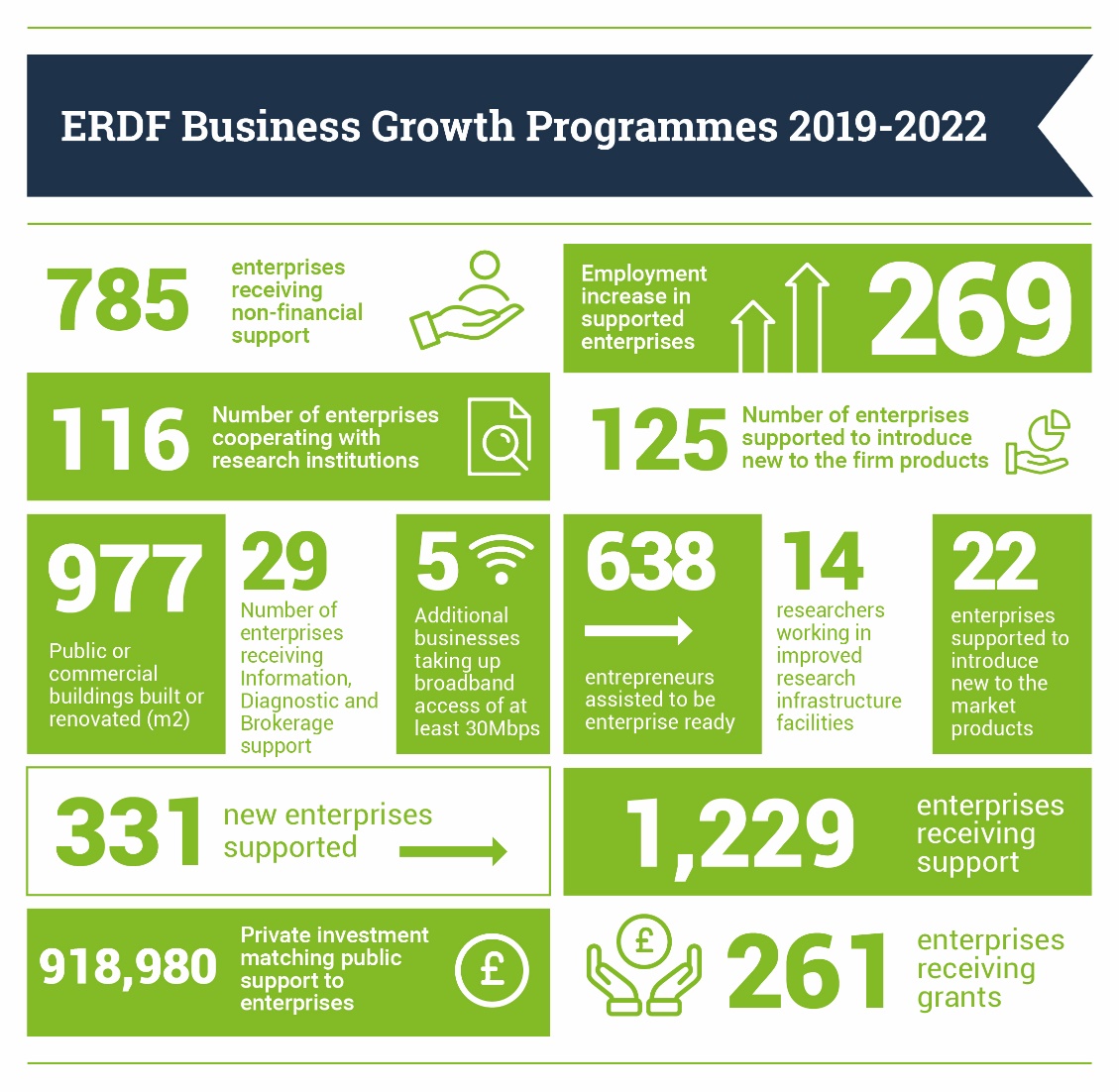
A selection of example case studies providing evidence of beneficiaries who have accessed our expertise and support via our funded projects illustrating impact and how UoW addresses the challenges faced by business operating in the region:
BRIC
CALMERIC
https://www.wlv.ac.uk/business-services/project-legacy-page/calmeric-project/calmeric-case-studies/
ENTRESS
https://www.wlv.ac.uk/business-services/funding-and-support/entress/case-studies/
Smart Concept Fund
SOLVD
https://www.wlv.ac.uk/business-services/project-legacy-page/solvd/case-studies-/
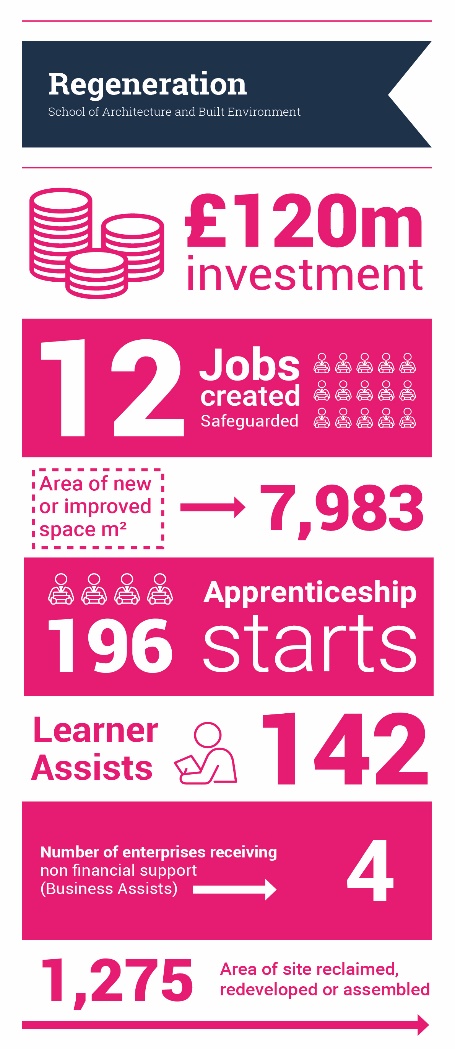
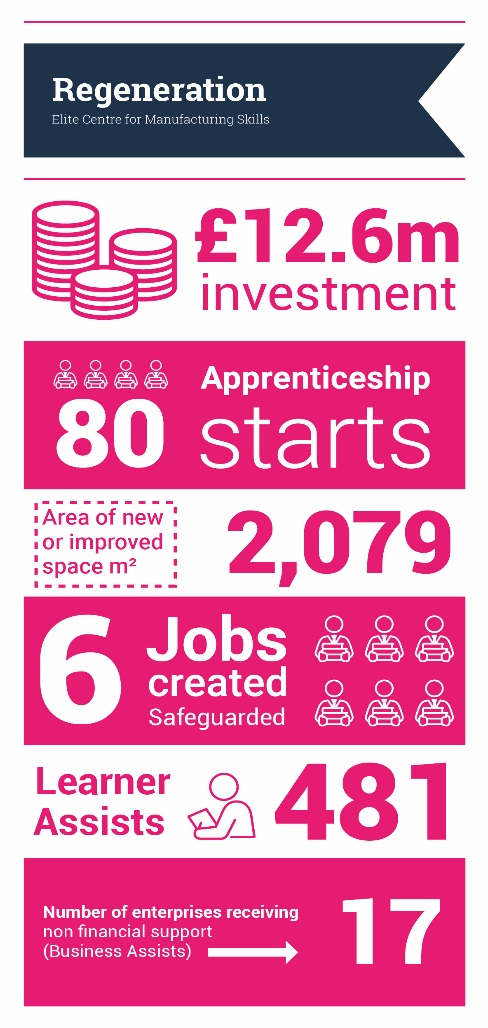
https://www.fgould.com/uk-europe/projects/elite-centre-manufacturing-skills-university-wolve/
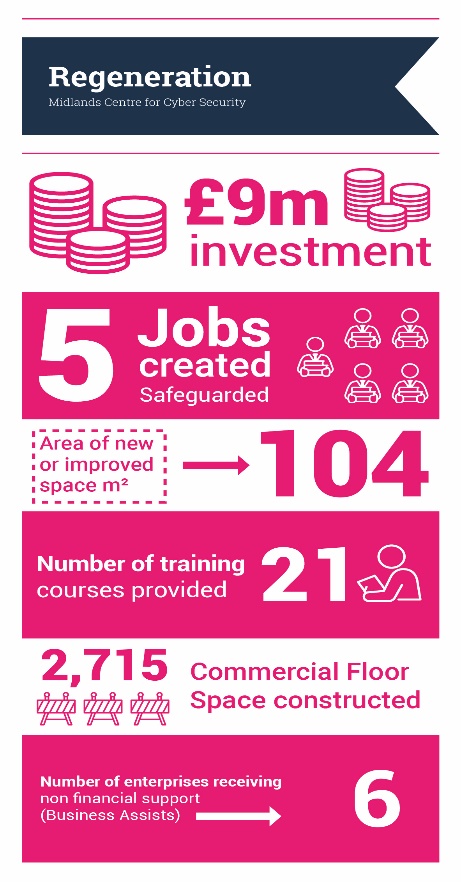
https://www.marcheslep.org.uk/projects/cyber-quarter-midlands-centre-for-cyber-security/
https://ramboll.com/projects/ruk/cyber-quarter
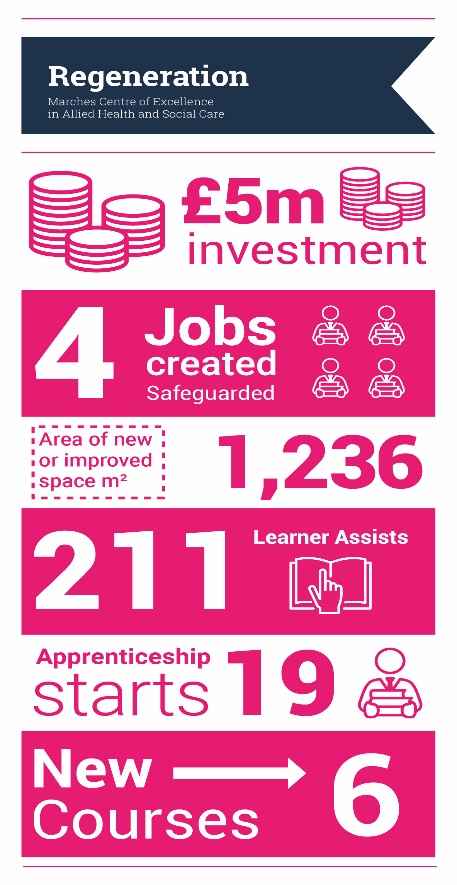
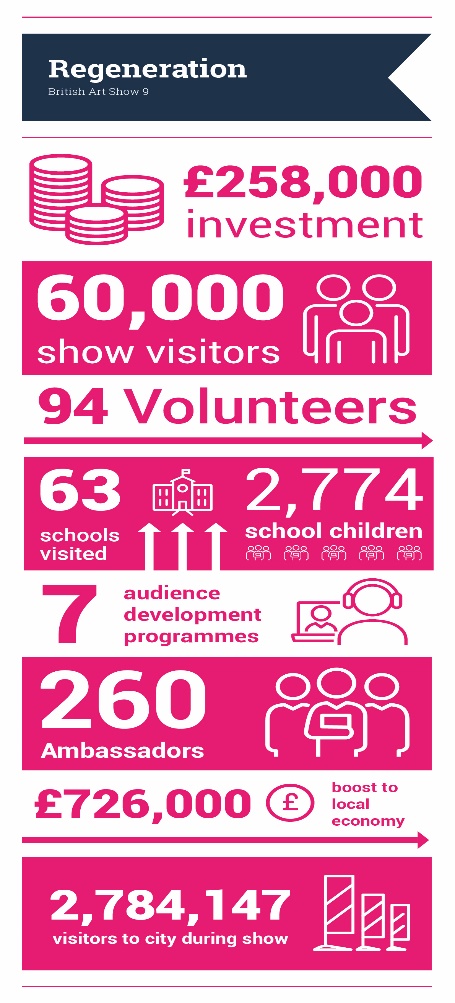
https://www.bbc.co.uk/news/uk-england-birmingham-60082050
https://contemporaryartsociety.org/news/friday-dispatch-news/british-art-show-9-wolverhampton/
https://www.theartistsprintroom.co.uk/british-art-show-9/
Public & Community Engagement
Summary of approach
For the University of Wolverhampton, public and community engagement is about people in their local places. We use our expertise, resources, and commitment to make lasting differences to the lives of people of all ages. We work collaboratively with our partners and communities to achieve mutual benefit using our knowledge, passion and enthusiasm for learning to light people’s imagination, transform their thinking, stimulate innovation, and open opportunities and employment. We invest in highly-skilled people, buildings and initiatives to make this happen. Our strategic approach is embedded in our DNA and focuses on reducing the challenges our communities face. We are proud of the impact our knowledge exchange approach is achieving - making a real difference to create new opportunities.
Aspect 1: Strategy
As the ‘University of Opportunity’ our place informs our strategy, and we aim to transform society by ensuring the needs of our place. People are at the heart of what we do (Vision 2030) and our public and community engagement (P&CE) is about ‘people in their place’. Uniquely, the social and economic challenges of our place necessitate an embedded, whole-institution approach. Place shapes our future and we help to shape it. Commitment to opportunity is guided by values of equity, inclusion and diversity and our partnership approach ensures that P&CE is strategically embedded, focusing on addressing the specific, prioritised needs which are agreed with our partners and communities (and which have been further exacerbated by COVID-19) to achieve long-term sustainable impact.
Our resources, support, and activities are targeted and predicated on creating/enhancing opportunity by removing barriers to prosperity for communities. Given the complexity of the challenges in our region, we are clear about the contribution we make as an anchor institution in bringing employment/skills/learning/funding and innovation as we work reciprocally with our public and communities (Diagram 1).
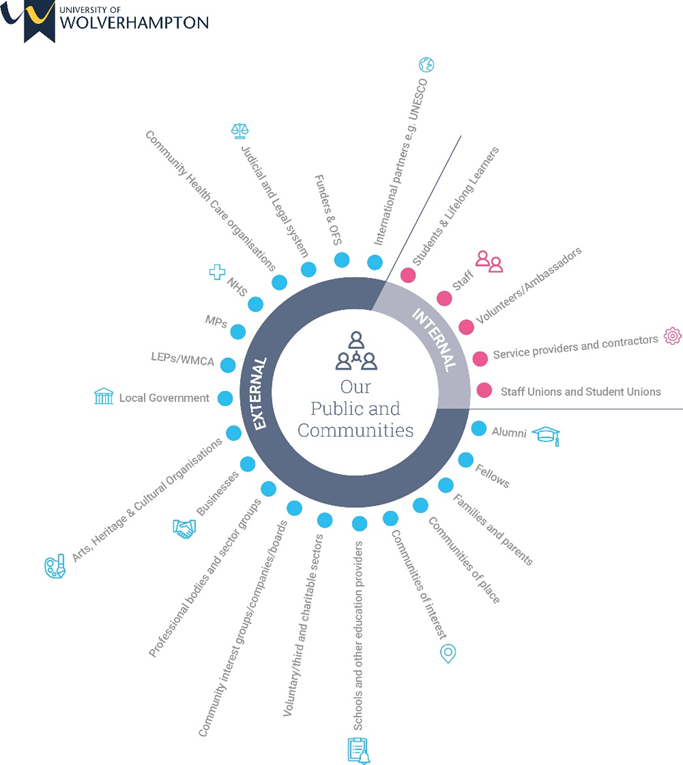
Diagram 1: Our Public and Communities
We strive to work as one with our communities. We pride ourselves on working in partnership, engaging with our local population, and having a commitment to the wellbeing of all residents regardless of age or background. Our staff, students and alumni live and work within the place that we serve.
We make a difference to the lives of people in a range of ways by taking knowledge to them in ways they will enjoy, understand and engage with.
P&CE is one of our greatest strengths, embedded in our culture and owned by all staff. Our Regional Engagement sub-strategy provides the framework for core strands of external activity. Engagement is not a series of separate activities, but a place-based model focused on addressing challenges and improving aspiration, ambition, and opportunity.
Governance and reporting were through senior committees, led by the VC and Deputy VC. Strategic and faculty-based leadership led by the Associate Director (Place), Principal Lecturer KE, Deputy Director External Engagement, Director of UK Student Recruitment, Access and Partnerships, ADs for Research and KE and KE faculty champions.
Through an in-depth understanding of our place, we develop appropriate sustainable solutions in collaboration with all stakeholders. For example, our Access and Participation Plan focuses on key target groups, including care leavers, mature learners, and low participation and income groups, and we take our responsibility to support wider underrepresented groups seriously.
Specific selected examples below demonstrate our approach and show how, through P&CE, KE occurs with/in our communities to achieve mutual benefit and gradual change:
Changing the community’s view of STEM: Regionally there has been low take-up of study in STEM fields and entry to STEM careers, low attainment and poor progression. In partnership with key stakeholders we have sought to be transformational, addressing low participation rates, limited access to sciences and outdated/limited understanding of what STEM entails.
Arts, culture, and inclusion: Using arts/cultural activities we work collaboratively with diverse groups and communities to address hidden issues and break down barriers.
Our Centre for Sikh and Panjabi Studies is the first of its kind in the UK, founded in the home of the second largest UK-based Sikh population. Our goal is to promote community cohesion, engagement, and cultural understanding both locally and nationally, keeping Sikh heritage alive for future generations through a programme of events and activities.
Working with Local Authorities, NHS Trusts, Government Bodies and policy makers, we have developed embedded inclusion and built on a commitment to ensure local voices and needs are at the heart of transformational change across a range of societal and health-based challenges. We drive social development and change, joint innovation to support research, empowering people outside of the University through peer and community research and co-production, use of community expert panels, and mutual sharing.
Aspect 2: Support
To create transformation, our P&CE must light the imagination, stimulate innovation, and/or open new learning, employment and innovation opportunities across the life-course. To achieve effective KE, our investment support is three-way: infrastructure, people, and initiatives.
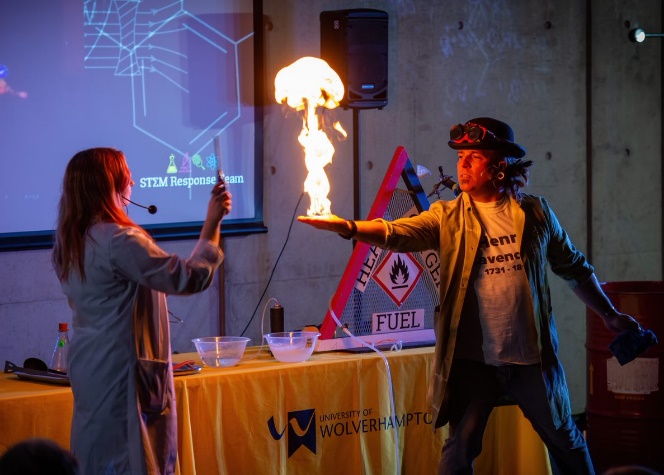
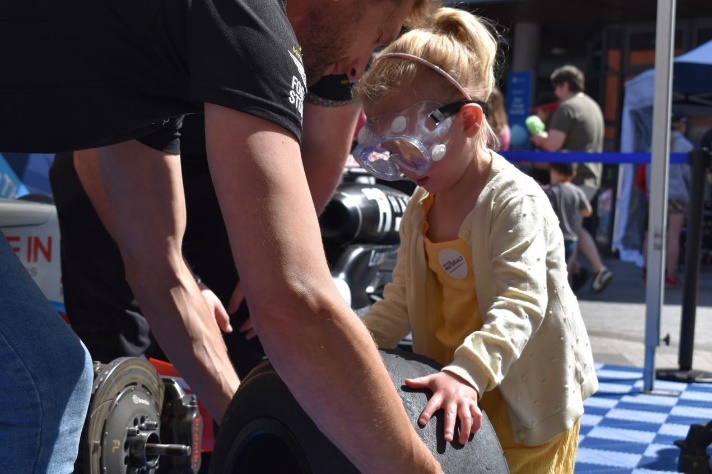
Initiatives focused on the uniqueness of place share the benefits of our expertise, knowledge, and research.
Since 2017, the Institute for Community Research and Development (ICRD) has been working to improve the lives and life chances of people in the region through research-driven policy development, promoting social mobility, and by delivering effective community-based transformational projects. P&CE occurs through research and evaluation projects, and Peer and Community Research. ICRD uses interdisciplinary expertise to affect positive change by working collaboratively with local communities and partnership networks. The Institute provides education, training and skills development for researchers, practitioners, and students.
Over the past 3 years, the Regional Learning Centres in Telford and Stafford have embedded public and community engagement in the heart of their communities.
Initiatives such as these catalyse action, secure additional funding, and mobilise resources to achieve new outcomes.
As many of our staff, students and alumni live within 25 miles of the university, commitment to place and people is embedded. Various roles include P&CE, such as the progression route to Associate Professor (KE) and relevant staff are given appropriate workload capacity to deliver this. Given our diversity, we commit resources to training and development for staff and students to ensure inclusivity. We provide specialist P&CE-related CPD, training and skills development for staff, students, partners and the community: Faculty KE champions and central KE staff provide advice, training and support for staff; Community Engagement Access Workstream support group; co-production-based projects and activity; peer and community research support; student/alumni volunteering and paid opportunities in relevant public and community projects, such as BAS9 and Scifest.
Between 2019 and 2022 we advertised 4,378 opportunities to students, consisting of sandwich and summer placements, work experiences, volunteering opportunities, virtual internships and student training programmes. We also advertised 17,952 student and graduate positions during this period, working on average each year with 200 voluntary groups and 800 national, global and SMEs. COVID had a major impact on the number of opportunities available to students, so we coordinated virtual internships and volunteering opportunities such as NHS Responders.
Similarly, our programme of support for students has resulted in the employment of 91 GTAs/academic coaches/student transition teachers.
We recognise achievement though annual staff, student, alumni and partner awards and profiling of engagement activity.
External Engagement leads communications with the public and partners of all types through our website and social/media coverage. Examples include WLVInsider (staff news), quarterly Alumni newsletter, Business Engagement Newsletter and Research Matters. During the pandemic these partnerships and communications networks formed the backbone of responses, keeping information channels open and providing reassurance and integrated approaches.
Aspect 3: Activity
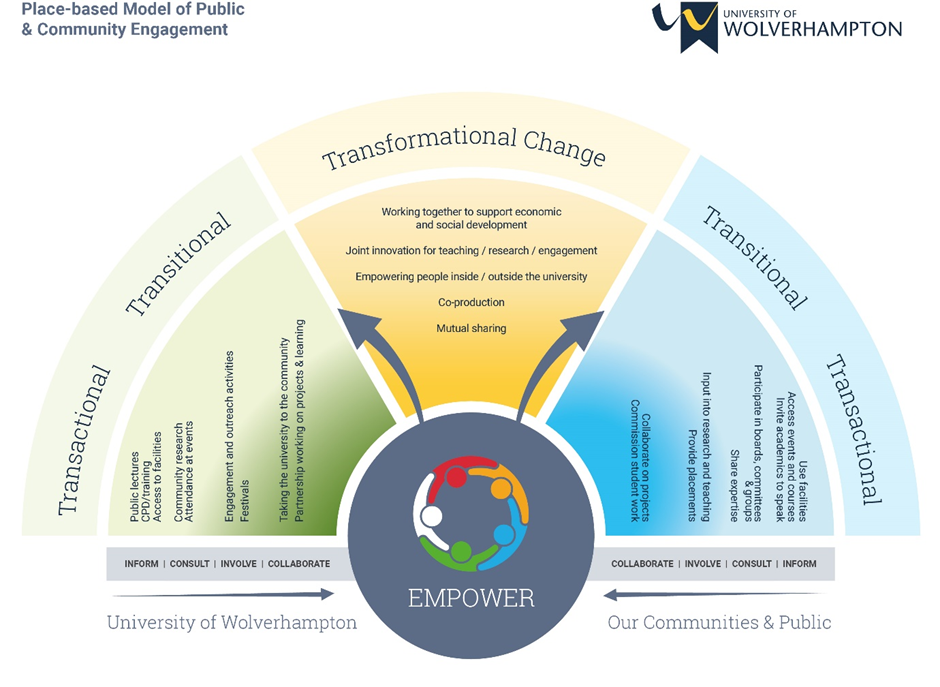
Diagram 2: Place-based model of P&CE
Our model, centred around evidence-based needs and challenges, requires a wide breadth and depth of activity linked to intention, outcomes and impact. It is dynamic, multifaceted, and developmental moving from transactional to transformational. Whilst discrete activities are important, our overarching goal is co-production to achieve transformation, and this takes time. Diagram 2 represents this complexity and provides examples of the types of activity undertaken.
The specific examples of activity described below have been selected to best illustrate the variety of activities and approaches we undertake, how they support our strategy and meet the needs of our public and communities.
There is an ever-increasing portfolio of collaborative activity to address societal and health challenges:
Working with key local authorities to develop research to transform social care and community-based provision, including Birmingham Childrens Trust domestic violence and abuse and child protection; Telford, Violence against women and girls and Home Office Safer Streets 4 funding; Brookside Peer Research; Knife Angel Peer Research
Programme of activities which include webinars, seminars and podcasts which cover key topics of social policy or social action, research methods and challenges.
Alzheimer's Society has commissioned research and a subsequent project to support people and their families to live well with dementia from diverse communities in Wolverhampton.
Funded by Alzheimer’s Research (£25k), staff are working with five community groups across the UK to adapt the ‘Think Brain Health’ campaign to address the language barrier and meet the needs of Chinese communities.
Co-production and co-design involving patients and the public to promote patient-based health service improvements, engaging patients and citizens in solving healthcare challenges. The Royal Wolverhampton NHS Trust and UoW have undertaken comprehensive co-design work, academically supporting the development of a co-production toolkit, explaining how to do it well and how to measure how affective the involvement of patients is.

5 Things about Dementia Punjabi booklet
We continue to use arts/cultural activities to work collaboratively with diverse groups and communities, addressing hidden issues and breaking-down barriers:
The Dying 2 Talk AHRC-funded project, in collaboration with University of Bradford, used archaeological case studies to break-down barriers about talking about death, dying and bereavement with young people. Working with 14-19-year-old project ambassadors, activities and resources were created to prompt those conversations in an appealing and accessible way. These were trialled in a number of “Festival of the Dead” events in schools in Wolverhampton and Bradford, receiving excellent feedback.
Through a Windrush Community Fund project (£24k) we are working with the Windrush Legal Advice Clinic to raise awareness by giving voice, through art, to the narratives of successful Windrush compensation applicants. The project gives affected people the confidence to engage with government departments regarding claims, aiming to promote support avenues and allay fears.
Our annual Artsfest programme has engaged with over 3,500 members of the public in the past 3 years across almost 200 events. Artsfest marks specific events such as Black History Month, International Women’s Day, Disability History Month and LGBTQ+ History Month. Over 11,000 people have retrospectively viewed the events recordings on YouTube.
The Gift of Giving project worked with the NHS and Sikh Donor/Recipient families to commission artwork/digital media work to promote donation and law change, whilst at the same time debunking ‘myths’.
The Arena Theatre hosts in excess of 200 performances per year to 15,000 visitors across Wolverhampton and the Black Country. Through its artist development programme, the venue engages over 300 artists per year, including a youth theatre for 9-18-year-olds and an arts management programme for 12-21-year-olds to raise aspirations for young people to pursue careers in the creative industries. The theatre is a National Portfolio Organisation with Arts Council England due to its reputation for accessible theatre and is home to learning-disabled company Mosaic Disability Theatre.
In addition to the public’s engagement with the BAS9 exhibition (co-hosted by Wolverhampton School of Art and Wolverhampton Art Gallery) which attracted 7,648 to the School of Art venue, we also delivered the community ambassador programme (funded by Arts Council England). These were local representatives who helped promote the exhibition to their wider community, building new relationships in the city and facilitating events and workshops for 260 participants.
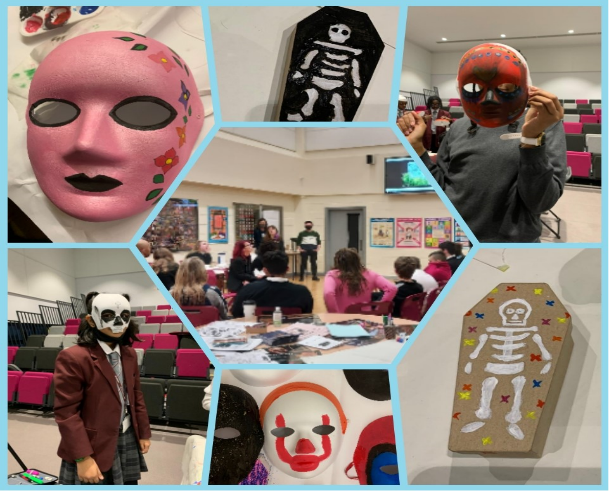
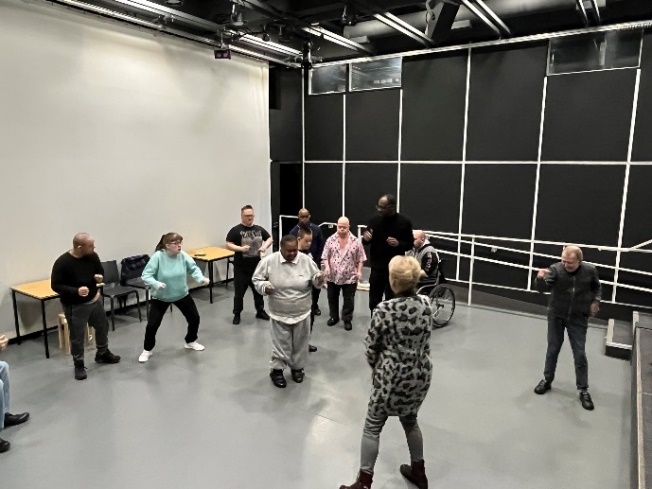
Mosaic Disability Theatre Dying 2 Talk Project
We made a significant contribution to supporting our communities during the pandemic, and continue to collaborate and lead on research and evaluation work:
Research was carried out to observe the impact of COVID-19 among BAME communities in West Midlands
A team of academics completed a research project looking into the local community of the West Midland’s innovation and enterprise in response to the pandemic
ICRD worked with the City of Wolverhampton Council to deliver the #WolvesWellbeingandMe project, coproducing a range of work with 9 community groups to provide insights and shape responses to the mental health and wellbeing of local people and communities following COVID-19
There was a webinar exploring domestic violence and COVID-19 and its impact on the provision for services
We have a body of work celebrating women's achievements and raising awareness about discrimination, including the ALL HER Voices conference in May 2022, International Women’s Day 2022 Business networking event, and Women in Chemistry event, July 2021.
Our Legal Advice Centre provides legal advice to the community on a wide variety of issues such as employment law, wills and probate, property law, and consumer-related issues. It also serves our student community, providing practical opportunities to get involved in every aspect of dealing with a client’s case, from managing client enquiries, booking appointments, interviewing, researching to providing both oral and written advice.
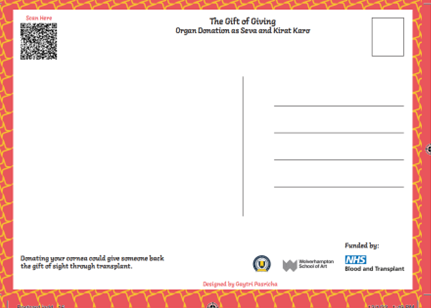

Give of Giving Project Cornea Postcard
Aspect 4: Enhancing practice
Our model focuses on outcomes/impacts for communities/partners and us. Integrated multi-faceted P&CE work is evaluated and reported using key metrics as required by HE-BCIS and internal governance and reporting. However, these do not capture complex transformational roles of P&CE for anchor universities with a civic mission, such as positive changes in understanding engineering as a career for women. This is an ongoing challenge.
We track the range and type of impacts achieved through activity monitoring, evaluation and reporting. The specific frameworks, models and methodologies used differ, depending on factors such as external funder requirements, internal funding allocations reporting, ethical considerations and stakeholders involved.
Strategic areas of internally supported activity, such as the STEM Response Team, report annually on activity, outputs and impact.
Aspect 5: Building on success
The central university Business and KEF Sub-Committee consolidates existing P&CE reporting activity, creating a coordinated process for linking outputs and outcomes, and ensures consistent evidence-gathering, models of investment, and evaluation measures using logic chains frameworks to ensure transparency, integration and consistency.
The faculty-based Business and KE Sub-Committees carry out a similar role at faculty level and implement operational processes and monitoring.
Activity is measured against the strategic plan and relevant sub strategy success measures, and locally against faculty KE plan KPIs.
The Strategic Planning and Performance Office collates and monitors this data. Progress and monitoring against strategic objectives takes place through senior and faculty-based committees.
We are also implementing and monitoring our KEF Concordat Action Plan. The process of self-assessment and subsequent identified areas for improvement has facilitated progress in developing this aspect.
As outlined in Aspect 2, we promote and disseminate this work widely, both internally and externally and act on feedback where appropriate.
We are increasing collaboration with public and community groups to drive social development and change and involving them in evaluation and development of activity. This is being achieved through joint innovation to support research, empowering people outside of the university through peer and community research and co-production, use of community expert panels and mutual sharing.
Note You are currently viewing the latest version of this narrative statement. View the previous version as published in previous iterations of the KEF (KEF1 and KEF2)